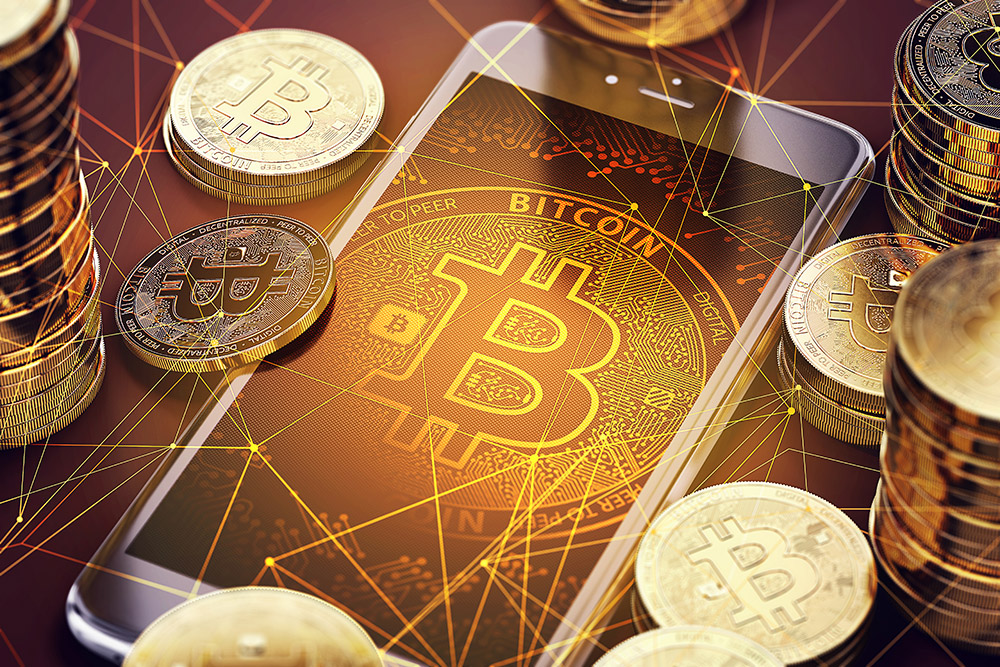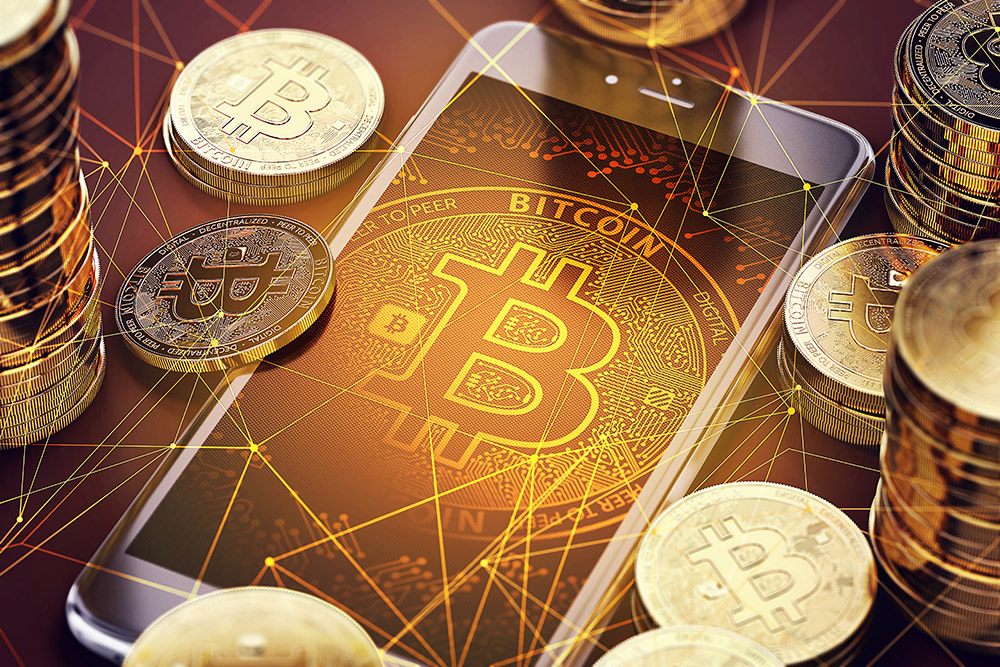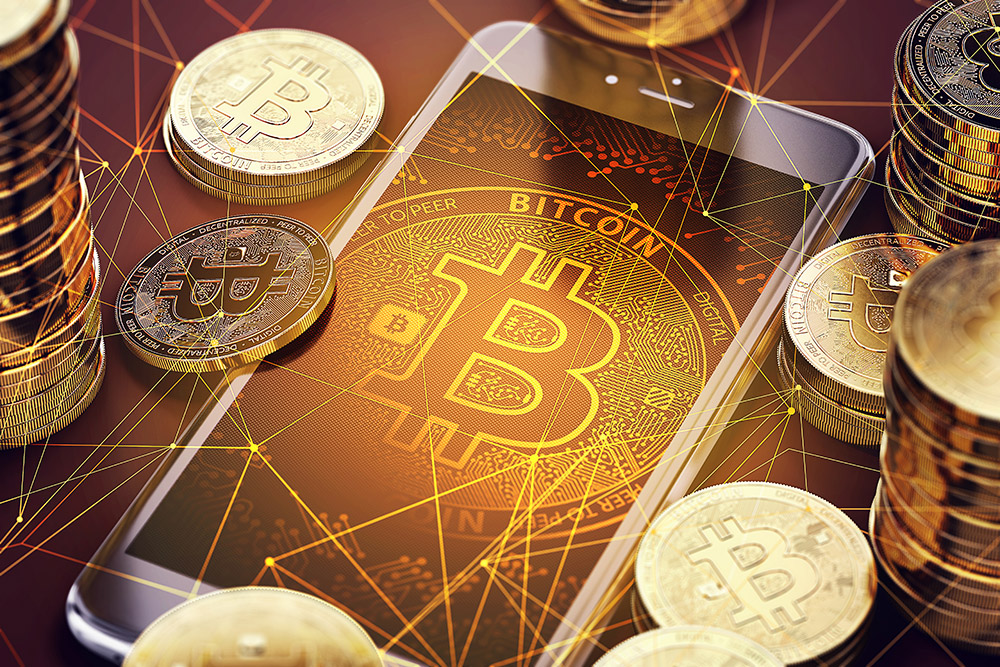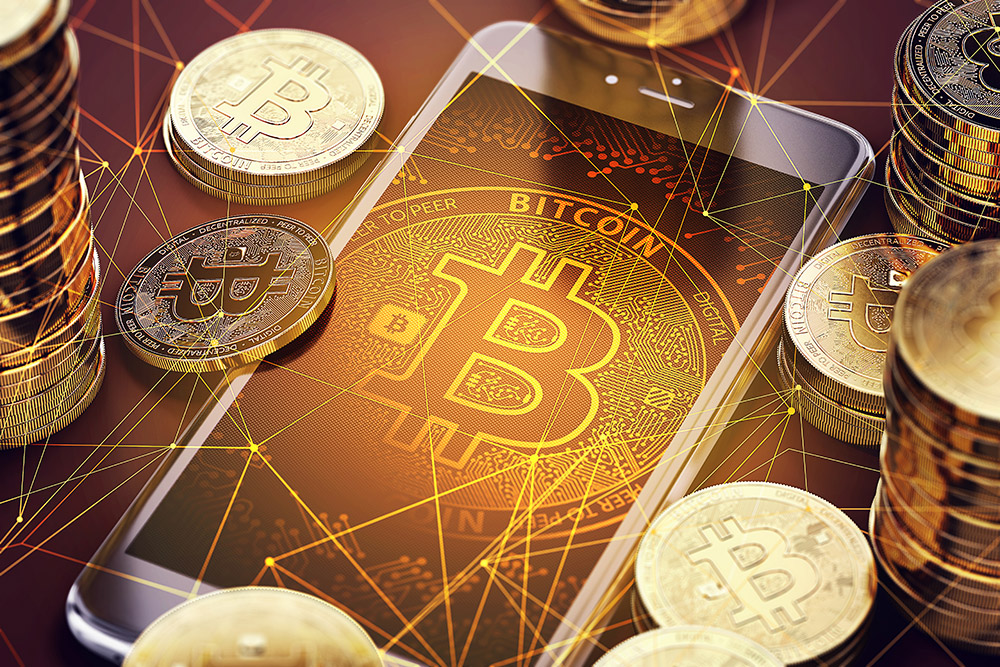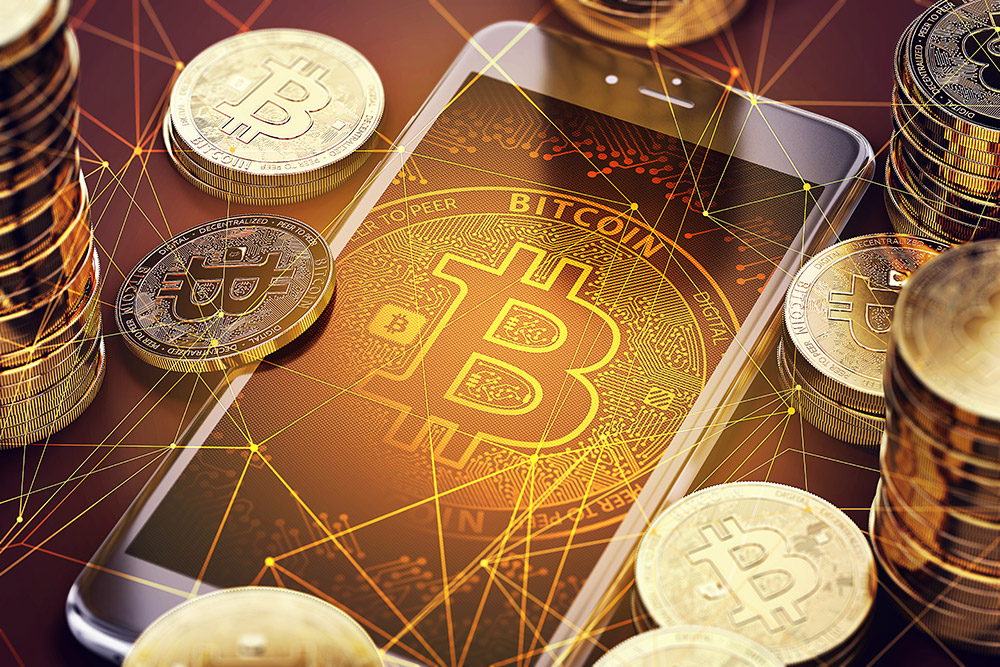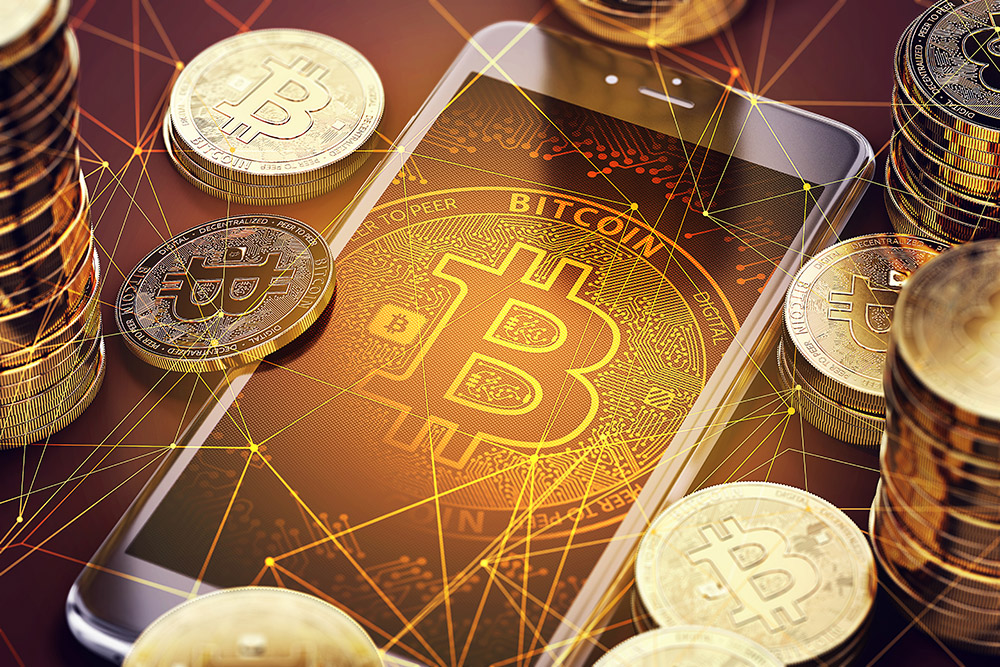The post NFT Marketplaces: Easy Start Guide appeared first on Coinpedia Fintech News
NFTs repsrent a recent economic trend, showcasing blockchain’s potential to reshape industries. NFT marketplaces – the fusion of technology and creativity – play a key role in this transformation. They are online spaces where creators sell unique digital items, and collectors buy these special assets. In simple words, they are hubs connecting artists and buyers in the digital world. NFTs introduce new ways of valusing digital content, with marketplaces acting as bridges for these transactions.
| Highlights Non-Fungible Tokens are unique digital assets.NFTs enable creators to share and monetise their work, while collectors can truly own a piece of the world of digital assets.An NFT marketplace is an online platform where unique digital items are bought and sold. Primarily, there are seven types of NFT marketplaces.OpenSea, Rarible, Nifty Gateway, SuperRare and NBA Top Shot are the five popular NFTs of the year 2023. |
1. What are NFTs?
NFTs, or Non-Fungible Tokens, are unique digital assets that use blockchain technology to establish ownership and provenance. Notably, the factor that differentiates NFTs from cryptocurrencies is that these unique digital tokens, for its non-fungible characteristic, cannot be exchanged on a one-to-one basis.
1.1. What are NFTs Assets
NFTs are generally used to represent ownership of digital art, music, videos, virtual real estate, and more. In short, what they do is they transform a price of creativity into a valuable digital asset. Non-Fungible Tokens enable creators to share and monetise their work, while collectors can truly own a piece of the world of digital assets.
1.2. Popular Systems for Buying, Selling & Creating NFTs
Blockchain technology is the backbone of NFTs, and the choice of blockchain platform significantly impacts key aspects such as creation, sale and acquisition of NFTs. While Ethereum remains the popular platform for these activities. Many other options have emerged. They include Binance Smart Chain, Flow by Dapper Labs, Tron, EOS, Solana, Polkadot, Algorand, Tezos, Cosmos and WAX. Notably, some of these blockchain exhibit interoperability. For instance, Ethereum-based non-fungible tokens can be transacted using Ethereum-based tokens (ERC-20 tokens), encompassing options like USDT, USDC, BNB, DAI, and more.
| Do You Know? NFTs are on track to make around $3.5 billion in 2023, jumping up by 22.82% each year until 2027, when they could hit a remarkable $8.1 billion, as per a statistics published in Statista. The US is leading the NFT charge, looking to earn around $1 billion in 2023. And get this – by 2027, there might be around 64.45 million people into NFTS, a growing trend all over the world. |
2. NFT Marketplaces: What Is It
An NFT marketplace is an online platform where unique digital items, such as artworks, music and games, are bought and sold. It is similar to traditional markets. In short, it serves as a platform to exhibit, trade and create non-fungible tokens.
2.1. What’s So Special About NFT Marketplaces
NFT marketplaces are unique. There are a few interesting elements that make them special.
- Big Digital Market
The NFT Marketplace sector is growing, and has the potential to play a big part in the economic environment of the future.
- Hidden & Private
NFT marketplaces are non-physical in character, since they are online platforms. This factor makes them untraceable. In NFT marketplaces, purchases are done using crypto wallets.
- Need an Account
You can’t do anything on an NFT marketplace without an account.
- Require Compatible Wallets
Different digital platforms work with different wallets. If you want to use a marketplace for a specific type of digital money, like Ethereum, you need a compatible wallet, like MetaMask.
- Using Crypto Wallets
Before you can do anything on an NFT marketplace, you need to put some digital money in your wallet. If you want to use a marketplace based on Ethereum, you will need to buy Ethereum and store it in an Ethereum wallet to use that marketplace.
- Easy to Understand
NFT marketplaces are simple to use.
3. How Do NFT Marketplaces Work
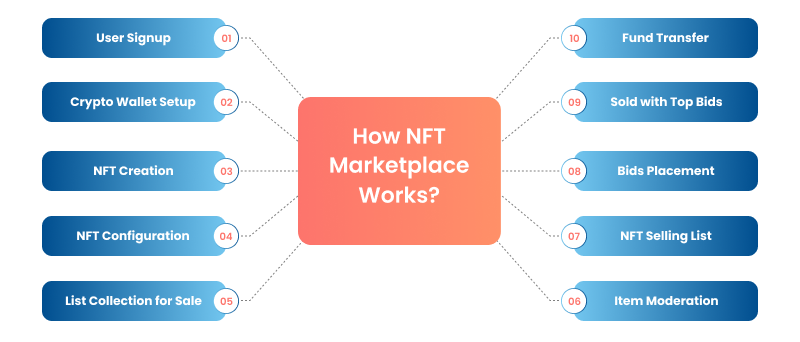
NFT marketplaces operate through simple steps easy for users to navigate. Here is a breakdown of how NFT marketplaces work.
- User Signup
Create an account on the NFT marketplace.
- Crypto Wallet Setup
Link your account to a crypto wallet by entering your wallet password.
- NFT Creation
Generate your unique digital item or artwork to be sold as an NFT.
- NFT Configuration
Provide details like title, description, and attributes for your NFT.
- List Collection for Sale
Set your NFT for sale on the marketplace, specifying a fixed price or choosing auction.
- Item Moderation
The marketplace reviews and verifies your NFT to ensure it meets quality and authenticity standards.
- NFT Selling List
Once approved, your NFT is displayed in your marketplace profile or store, indicating that it is available for purchase. You can specify a fixed price or choose the option of auction.
- Bids Placement
If you choose the auction option, interested buyers place bids on your NFT, competing to offer the highest price.
- Sold with Top Bids
The NFT is awarded to the highest bidder once the auction duration ends.
- Fund Transfer
Following a successful sale, the marketplace securely transfers the funds to your crypto wallet account, completing the transaction.
3.1. How Do NFT Marketplaces Make Money
There are several revenue sources for NFT marketplaces. The below mentioned are the general ones.
- Transaction Fees: Charging a percentage for each NFT sale or transfer
- Listing Fees: Charging creators to list NFTs, deterring low-quality content
- Featured Listings: Offering paid visibility for NFTs on platform sections
- Secondary Market Fees: Gaining a cut from NFT resales
Some NFT marketplaces have some innovative revenue sources also. They are:
- Premium Services: Charging for verified badges, analytics, and support
- Partnerships: Collaborating with artists or brands for exclusive drops
- White Label Solutions: Licensing tech to third-party marketplaces
- Advertising: Displaying ads or sponsored content
- Subscriptions: Offering premium tiers for exclusive perks
4. How Many NFT Marketplaces are There
Primarily, there are seven types of NFT marketplaces: Curated NFT Marketplace, Open NFT Marketplace, Hybrid NFT Marketplaces, Fractional Ownership Marketplace, Auction NFT Marketplace, Social NFT Marketplaces and Gaming NFT Marketplaces
4.1. Curated NFT Marketplaces
These marketplaces are special. In a curated NFT marketplace, its team of experts selects the best NFTs based on quality, uniqueness and theme. This helps collectors easily find great NFTs. SuperRare is the best example.
4.2. Open NFT Marketplaces
In these marketplaces, anyone can buy or sell NFTs. There exists no limit. So, these marketplaces generally have many NFTS, but quality varies. Rarible is a popular open NFT marketplace.
4.3. Hybrid NFT Marketplaces
These marketplaces have the best of both curated NFT marketplaces and open NFT marketplaces. They show carefully chosen NFTs and also allow anyone to sell. This mix creates an exciting user experience. The perfect example is Binance NFT marketplace.
4.4. Fractional Ownership Marketplaces
These marketplaces allow many people to share and buy parts of expensive NFTs together. This makes NFTs affordable and less risky to invest in, benefitting a wider audience. Maecenas is the most popular fractional ownership marketplace.
4.5. Auction NFT Marketplace
They sell NFTs through bidding. In a bidding process, the highest bidder wins. Auction NFT marketplaces offer fair deals for both sellers and buyers. OpenSea is the best example.
4.6. Social NFT Marketplaces
These marketplaces enable creators to make and sell their NFTs directly to fans. These are perfect for independent creators, as they allow creators to keep control of their NFTs and earn fair profits. Foundation and Nifty Gateway are two successful social NFTs marketplaces.
4.7. Gaming NFT Marketplaces
These marketplaces let players buy, sell and trade game stuff as special digital items. This provides an opportunity for players to earn money by playing games. Immutable X and Enjin are the two popular gaming NFT marketplaces.
5. The Largest NFT Marketplaces in 2023
OpenSea, Rarible, Nifty Gateway, SuperRare and NBA Top Shot are the five popular NFTs of the year 2023.
5.1. OpenSea NFT Marketplace
OpenSea, developed in 2017, is one of the oldest NFT platforms. It is an user-friendly platform, suitable even for beginners. It supports Ethereum, Solana and several other cryptos. Creating an OpeanSea account is simple and free. Generally, they charge a 2.5% fee on transactions.
| Do You Know OpenSea, considered as the world’s largest NFT marketplace, hosts a staggering 250,000 monthly traders. This platform not only facilitates NFT trading but also offers an NFT price tracker. |
5.2. Rarible NFT Marketplace
This is a NFT marketplace to buy and sell art, game stuff, and NFTs using Ethereum, Polygon, Tezos and Immutable X. Rarible has its token, RARI, for users to vote on decisions. It partnered with Adobe for verifying NFT data. It’s good for a big network, and connects well while staying decentralised.
5.3. Nifty Gateway Marketplace
Nifty Gateway, backed by Gemini, was an early big NFT marketplace. It had a major $6.6 million NFT sale and reached $300 million in value. It offers scheduled NFT drops and a marketplace with famous artists. Signing up in this marketplace is easy. You can use credit cards or ETH to buy. Gemini integration lets you use your balance for purchase and withdrawals.
5.4. SuperRare NFT Marketplace
SuperRare is a classier option than Rarible. It appears clean and simple. It’s pickier about art quality, working closely with artists. To sign up to this marketplace, you need a supported crypto wallet like MetaMask or Formatic. It is easy to get a username and password connected to your wallet.
5.5. NBA Top Shot NFT Marketplace
This NFT marketplace, created by Dapper Labs, is known for digital basketball highlight cards. You can buy packs, keep in your crypto wallet, see or sell on the marketplace. It’s highly popular because it is simple to use and understand. The simplest method to sign up to this marketplace is to link your Google account to Dapper.
Endnote
The landscape of NFT marketplaces is diverse and promising. These platforms come in various types, from open marketplace to curated marketplaces and hybrid marketplaces, providing opportunities for both artists and collectors. Artists gain exposure, control and royalties, fostering their creative journey. Collectors fund unique assets and investment prospects. The support for creativity is evident through innovative NFT formats and interactive features. As technology advances, the scope of NFT marketplace types is expected to expand, accommodating wider interest and niches. Anyway, the future of NFT marketplace is bright, with potential integration in virtual reality, gaming and other domains.
FAQs
[Q1] What is an NFT marketplace?An NFT marketplace is an online platform where users can buy, sell and trade non-fungible tokens.
[Q2] How do I buy an NFT on a marketplace?To buy an NFT, you need to create an account on the NFT marketplace, connect a compatible crypto wallet, fund your wallet with the appropriate cryptocurrency, browse the available NFTs, place bids or make direct purchases using the marketplace’s interface.
[Q3] Can I sell my own creations on NFT marketplaces?Yes, you can sell your own creations on NFT marketplaces. You will need to mint your digital artwork into an NFT, set a price or auction terms, and list it on a compatible marketplace.When a buyer purchases your FT, you will receive the agreed-upon payment in cryptocurrency.
[Q4] What is the difference between minting and listing and NFT?Minting an NFT refers to the process of turning a digital item into a unique token on the blockchain, Listing an NFT involves putting the minted token up for sale on a marketplace, specifying its price, auction type, or other terms for potential buyers.
[Q5] Are there any fees associated with NFT marketplaces?Yes, most NFT marketplaces charge fees for listing, selling and transferring NFTs. These fees can vary widely between platforms and might include gas fees as well.
[Q6] Which blockchain network is commonly used for NFTs?Ethereum is the most widely used blockchain for NFTs, but other networks like Binance Smart Chain, Flow, and Polygon have gained popularity due to lower fees and faster transactions.

